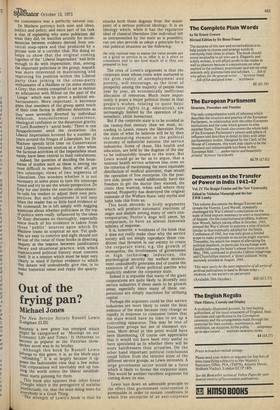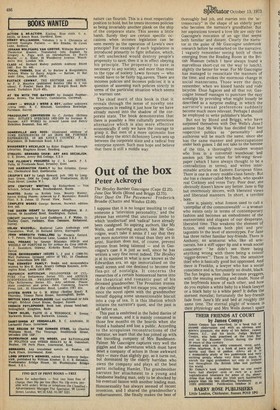Out of the frying pan?
Michael Jones
The New Service Society Russell Lewis (Longman £3.25) Recently a new genre has emerged which might be categorised as 'Musings on our Economic Life and Times.' It threatens to become as popular as the Victorian threedecker novel was in its heyday.
Although this book by Russell Lewis belongs to this genre, it is, as the blurb says ' refreshing." It is so largely because it opPoses the fashionable view that a few industrial corporations will inevitably end up running the world unless the liberal establishment starts gunning for them. This book also opposes that other Great Thought which is the prerogative of socialist intellectuals, viz, that the state doing more for everybody is a Good Thing.
The strength of Lewis's .book is that he attacks both these dogmas from the standpoint of a serious political ideology. It is an ideology which, while it has the regulative ideal of classical liberalism (the individual left as untrammelled by the state as is possible), can yet also provide as adept a principle for a real political situation as the following:
the only rational way to assess the value people put on a good or service is to offer it at a price to consumers and to see how much of it they are prepared to buy.
The crux of Lewis's argument is that the corporate state whose roots were nurtured in the grim reality of unemployment and poverty, will encourage, as the level of prosperity among the majority of people rises year by year, an economically inefficient allocation of resources. Much more importantly it poses a major political threat in that people's wishes, relating to quite basic democratic _rights (e.g. education), are increasingly limited by the operation of paternalistic, elitist bureacrats.
But if the corporate state is to be avoided in the twenty-first century then we must, according to Lewis, ensure the liberation from the state of what he believes will be by then the dominating element in the political economy of industrial nations: the service industries. Some of these, like health and education, are held by the dogmas of the day to be indissolubly bound to the state. But Lewis would go as far as to argue, that a national health service achieves less, even on the criterion of maximising the most equitable distribution of medical attention, than would the operation of free enterprise. On the positive side, people would additionally have the freedom to get the doctor they wanted, the clinic they wanted, when and where they wanted. Prosperity has destroyed the original rationale of the Welfare State, only myths and habit hide this from us.
This book abounds in lively arguments which will produce automatic reactions of anger and disdain among many of one's contemporaries; Pavlov's dogs will seem, by comparison, to have an almost Jamesian subtlety of response.
It is, however, a weakness of the book that it does not really make clear why the service society will not simply reproduce those conditions that threaten in our society to create the corporate state; e.g. the growth of monopolies, the involvement of government in high technology industries, the psychological security the welfare environment undoubtedly generates and of course the existence of all those political parties who implicitly endorse the corporate state.
Indeed it is arguable that many of the giant corporations are quite likely to diversify into service industries if these seem to be growth areas; especially since many of these corporations are simply machines for utilising capital. Perhaps the argument could be that service industries are more likely to resist the fatal embrace of the state because they change so rapidly in response to consumer tastes that the state would have no time to set up a controlling apparatus. This may be true of Encounter groups but not of transport systems. More detail at this point would have been illuminating. Of course one appreciates that it would not have been very useful to have speculated as to whether there will be more hairdressers than actuaries. On the other hand important political conclusions could follow from the relative sizes of the different service groups, as Lewis intimates. A large government sector would be a force which is likely to favour the corporate state. This would be another excellent argument for cutting down its size.
Lewis lays down an admirable principle to the effect that government intervention is permissible in order to sustain conditions in which free enterprise of an anti-corporate nature can flourish. This is a most respectable position to hold, but he treats incomes policies as being invariably another plank on the ship of the corporate state. This seems a 'little harsh. Surely they are certain specific occasions when incomes legislation can be seen merely as the operation of Lewis's own principle? For example if such legislation is introduced primarily to fight inflation, which, if left unchecked would destroy people's propensity to save, then it is in effect obeying his principle. The propensity to save is necessary to any society, and more than most to the type of society Lewis favours — who would have to be fairly big.savers. There are incomes policies and incomes policies: it is a question of assessing such policies strictly in terms of the particular situation which seems ,to warrant one.
The chief merit of this book is that it reveals through the sense of novelty one experiences in reading it just how far we have already moved into the shadow of the corporate state. The book demonstrates that there is possibly a less culturally pernicious alternative which is also more effective economically if only we have the courage to grasp it. But men of a more optimistic hue would deny the strict dichotomy Lewis sets up between the corporate state and a radical free enterprise system. Such men hope and believe that there is still a middle way.



































 Previous page
Previous page